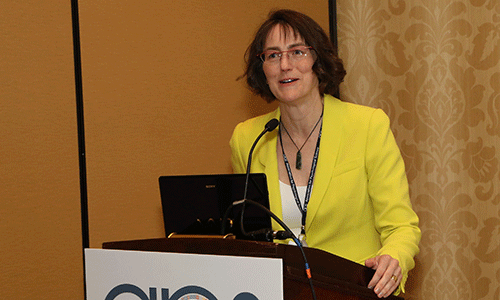New Frontiers in the Science of Positive Emotions

The distinctions between meaningful and hedonic pleasure is crucial for understanding how positive emotions affect health, says Barbara Fredrickson, University of North Carolina at Chapel Hill.
The notion that positive emotions play a critical role in our well-being is not new. By studying the evolutionary origins of emotions and emotions’ specific effects on our health, scientists are discovering that positive emotions don’t just make you feel good — they have an impact on our social interactions and health outcomes that may become written in our genes.
At a symposium during the 25th APS Annual Convention, psychologist Sara B. Algoe offered an overview of her work on the adaptive advantages of gratitude. Algoe studies the role of emotions in social interactions at the University of North Carolina at Chapel Hill. She believes that a key element predicting gratitude is how responsive (i.e., insightful and caring) the benefactor is to his or her beneficiary when a favor is performed.
This responsiveness serves to bind relationship partners together and may continue to be important even after the favor has been performed. In one experiment, Algoe found that benefactors who believed their real-life partners acted very responsively when expressing gratitude during an interaction in the lab tended to report higher relationship satisfaction six months later — a finding that held even when her team controlled for other factors related to overall relationship satisfaction (Algoe, Fredrickson, & Gable, 2013).
Algoe is also collaborating with UCLA psychologist Baldwin Way to identify a genetic basis for gratitude. She believes that because gratitude allows individuals to connect with high-quality, supportive social partners, specific genes facilitating gratitude may provide an adaptive advantage.
Laura D. Kubzansky of the Harvard School of Public Health has been measuring the relationship between positive emotions and health. One question that interests Kubzansky is whether positive emotions matter in and of themselves, or whether they serve as markers of the absence of negative emotions.

Sara Algoe, University of North Carolina at Chapel Hill, is involved in research aimed at identifying a genetic basis for gratitude.
She noted that optimism and emotional vitality (a measure related to engagement in life, emotional stability, and ability to regulate emotion) are related to a reduced risk for heart disease, even when controlling for negative emotions. Optimism has also been associated with reduced inflammation, higher levels of antioxidants, and higher levels of good cholesterol.
According to Kubzansky, the benefits of positive emotions are real. She hopes that other researchers will continue studying these benefits, even when a tendency to focus on problem-solving can make the study of negative emotions seem more important. “I always like to remind people that it’s good to look at the positive side of things because if you only look at the negative you only have one side of the picture.”
As it turns out, the positive side of that picture may be surprisingly nuanced. Barbara Fredrickson, at the University of North Carolina at Chapel Hill, highlighted the relationships between positive emotions, genetic expression, and health. Work that Fredrickson is conducting with Steven Cole of UCLA indicates that positive emotions — in particular, positive emotions that result from purpose or meaning as opposed to hedonic pleasure — are associated with healthier gene expression and a healthier immune system.
For Fredrickson, the distinction that separates meaningful pleasure from hedonistic pleasure is crucial for understanding how positive emotions affect health because not all positive emotions are equally beneficial. “I’ve argued that positive emotions broaden our awareness,” she said. “Part of that broadening awareness could be expanding our capacity to see that bigger picture in which our lives exist. So that we’re not just experiencing positive emotions about ‘give me more, give me more’, and ‘I’m so great’.” In other words, feeling good may not be good enough; it’s the experience of finding meaning in life that can impact good health.
References
Algoe, S. B., Fredrickson, B. L., & Gable, S. L. (2013). The social functions of the emotion of gratitude via expression. Emotion. Advance online publication. doi: 10.1037/a0032701





Comments
Barbara Frederikson distinguishes “meaningful pleasure” from “hedonistic pleasure.” Yet, what is emotion? Is there any emotion that is not hedonic?
See: What is emotion? Behav. Proc. 2002, 60: 69-84.
Cordially,
MC
—————————————————-
Michel Cabanac
Professeur émérite
Faculté de Médecine
Université Laval
1855 Commerciale
St-Jean-Xstome, QC, G6Z 2L2
Canada
[email protected]
418-839-5648
http://www.amazon.com/Fifth-Influence-Dialectics-Pleasure/dp/144018836X
APS regularly opens certain online articles for discussion on our website. Effective February 2021, you must be a logged-in APS member to post comments. By posting a comment, you agree to our Community Guidelines and the display of your profile information, including your name and affiliation. Any opinions, findings, conclusions, or recommendations present in article comments are those of the writers and do not necessarily reflect the views of APS or the article’s author. For more information, please see our Community Guidelines.
Please login with your APS account to comment.